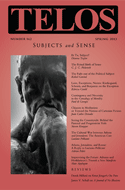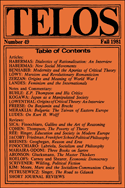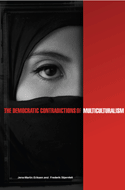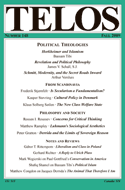By Maria Piccone · Friday, May 24, 2013 Happy 45th anniversary Telos! It’s been a long road, and we’re still going strong, thanks to the loyalty of our Telos readers. For our institutional subscribers, we want to offer you a 30% discount on our backfiles: your institution can have online access to decades of Telos discussions and debates. Ask your library to carry the online archive, a great way for readers to explore intellectual life since 1968.
Continue reading →
By Steven Knepper · Wednesday, May 22, 2013 Steven Knepper’s “Seeing the Countryside: Behind the Pastoral and Progressivist Veils” appears in Telos 162 (Spring 2013). Read the full version online at the Telos Online website, or purchase a print copy of the issue in our store.
 Building upon the work of Raymond Williams, this essay questions the lack of critical scrutiny given to the countryside and its cash crop monocultures. It holds that simple narratives of decline and progress contribute to this strange invisibility. Simple narratives of decline often contrast an idealized countryside and an insidious city, drawing a pastoral veil over the problems and economics of the actual working countryside. Simple narratives of progress often suggest that we have left the countryside behind entirely. When they do acknowledge continuing agricultural realities, they display what Vandana Shiva calls a “monoculture of the mind.” They present contemporary agribusiness as the only way to feed the world, thereby deflecting critical attention. In order to truly see the countryside and its centrality to modernity, this essay suggests we must draw back the pastoral and progressivist veils. Building upon the work of Raymond Williams, this essay questions the lack of critical scrutiny given to the countryside and its cash crop monocultures. It holds that simple narratives of decline and progress contribute to this strange invisibility. Simple narratives of decline often contrast an idealized countryside and an insidious city, drawing a pastoral veil over the problems and economics of the actual working countryside. Simple narratives of progress often suggest that we have left the countryside behind entirely. When they do acknowledge continuing agricultural realities, they display what Vandana Shiva calls a “monoculture of the mind.” They present contemporary agribusiness as the only way to feed the world, thereby deflecting critical attention. In order to truly see the countryside and its centrality to modernity, this essay suggests we must draw back the pastoral and progressivist veils.
Continue reading →
By J. F. Dorahy · Tuesday, May 14, 2013 As an occasional feature on TELOSscope, we highlight a past Telos article whose critical insights continue to illuminate our thinking and challenge our assumptions. Today, J. F. Dorahy looks at Seyla Benhabib’s “Modernity and the Aporias of Critical Theory,” from Telos 49 (Fall 1981).
 The critical theory of the Frankfurt School begins with Max Weber. With this claim I do not mean to suggest that Weber was the first critical theorist—as is well known, Hegel, Marx, and Nietzsche, each of whom wrote before Weber and had enormous influence on the Frankfurt School, are, to a greater or lesser extent, critical theorists. Rather, what this assertion draws attention to is the perspectival significance that Weber’s analysis of modernity holds for not only the first generation of the Frankfurt School—Adorno, Horkheimer, and Marcuse—but also for Habermas. In the last few decades, particularly in the highly influential and groundbreaking work of Axel Honneth, the Weberian diagnosis of modernity has lost its orientating position for critical theory. In its place stands the Hegelian notion of intersubjective recognition; subsequently, the once decisive notions of “rationalization” and “disenchantment” have given way, in contemporary critical theory, to the notions of “paradoxical development” and “disrespect.” Certainly, the socio-historical developments of the late twentieth and early twenty-first centuries bring into question the project and function of critical theory. So, too, the reflexive nature of the discourse necessitates the re-evaluation of its guiding concepts. Yet, many theorists have expressed significant reservations about the trajectory of contemporary critical theory, a trajectory that, in the words of Nikolas Kompridis, has veered “from reason to self-realization.” Perhaps, then, given the contemporary debate regarding the future directions of critical theory, the time is appropriate to revisit the history of critical theory and examine its variegated responses to the irrationality of modern reason. The critical theory of the Frankfurt School begins with Max Weber. With this claim I do not mean to suggest that Weber was the first critical theorist—as is well known, Hegel, Marx, and Nietzsche, each of whom wrote before Weber and had enormous influence on the Frankfurt School, are, to a greater or lesser extent, critical theorists. Rather, what this assertion draws attention to is the perspectival significance that Weber’s analysis of modernity holds for not only the first generation of the Frankfurt School—Adorno, Horkheimer, and Marcuse—but also for Habermas. In the last few decades, particularly in the highly influential and groundbreaking work of Axel Honneth, the Weberian diagnosis of modernity has lost its orientating position for critical theory. In its place stands the Hegelian notion of intersubjective recognition; subsequently, the once decisive notions of “rationalization” and “disenchantment” have given way, in contemporary critical theory, to the notions of “paradoxical development” and “disrespect.” Certainly, the socio-historical developments of the late twentieth and early twenty-first centuries bring into question the project and function of critical theory. So, too, the reflexive nature of the discourse necessitates the re-evaluation of its guiding concepts. Yet, many theorists have expressed significant reservations about the trajectory of contemporary critical theory, a trajectory that, in the words of Nikolas Kompridis, has veered “from reason to self-realization.” Perhaps, then, given the contemporary debate regarding the future directions of critical theory, the time is appropriate to revisit the history of critical theory and examine its variegated responses to the irrationality of modern reason.
Continue reading →
By Telos Press · Monday, May 6, 2013 Save 20% when you purchase at telospress.com
 The Democratic Contradictions of Multiculturalism, by Jens-Martin Eriksen and Frederik Stjernfelt, is now on sale in the Telos Press store. Purchase it here and save 20% off the list price! The Democratic Contradictions of Multiculturalism, by Jens-Martin Eriksen and Frederik Stjernfelt, is now on sale in the Telos Press store. Purchase it here and save 20% off the list price!
What is multiculturalism? Is it every person’s right in a democratic society to choose his or her religion and culture and to express criticism regardless of taboos and moralistic norms? Or is it the right of cultures and religions to be protected from insult and to preserve themselves against change? Jens-Martin Eriksen and Frederik Stjernfelt examine the ideology and the reality of multiculturalism, including the Muhammad cartoons, laws against blasphemy, hijab, the Islamic ban on apostasy, and the limits of the freedom of religion.
Continue reading →
By Paul di Georgio · Thursday, May 2, 2013 Paul di Georgio’s “Contingency and Necessity in the Genealogy of Morality” appears in Telos 162 (Spring 2013). Read the full version online at the Telos Online website, or purchase a print copy of the issue in our store.
 This article evaluates the relationship of the concepts of contingency and necessity to the historical developments and power relations in Nietzsche’s Genealogy. Both Nietzsche and Foucault maintain that, contra Herder, their genealogies are not grounded in originary investigation. Thus for their sort of genealogy to be a philosophically useful method, the force of interpretive analysis must be located elsewhere. The analytic force, I argue, is based in the relationship of values, events, and moral beings. Specifically, I maintain that the progression of moral stages in Nietzsche’s study is ordered in such a way that the failure of each stage is logically and structurally necessary, and that each failure structures the resultant system or paradigm. However, we must also note that the historical manifestation of moral paradigms which coincide with predicted or projected theoretical structures remains contingent upon a multitude of other historical factors, most importantly, human involvement. The conclusion is that systematic internal failures of moral stages allow for but do not cause successive events, since the structural scope of possibility within which a value may be held is best explained in terms of a “middle space” characterizable in both contingent and necessary terms. This article evaluates the relationship of the concepts of contingency and necessity to the historical developments and power relations in Nietzsche’s Genealogy. Both Nietzsche and Foucault maintain that, contra Herder, their genealogies are not grounded in originary investigation. Thus for their sort of genealogy to be a philosophically useful method, the force of interpretive analysis must be located elsewhere. The analytic force, I argue, is based in the relationship of values, events, and moral beings. Specifically, I maintain that the progression of moral stages in Nietzsche’s study is ordered in such a way that the failure of each stage is logically and structurally necessary, and that each failure structures the resultant system or paradigm. However, we must also note that the historical manifestation of moral paradigms which coincide with predicted or projected theoretical structures remains contingent upon a multitude of other historical factors, most importantly, human involvement. The conclusion is that systematic internal failures of moral stages allow for but do not cause successive events, since the structural scope of possibility within which a value may be held is best explained in terms of a “middle space” characterizable in both contingent and necessary terms.
Continue reading →
By Michael Millerman · Tuesday, April 30, 2013 As an occasional feature on TELOSscope, we highlight a past Telos article whose critical insights continue to illuminate our thinking and challenge our assumptions. Today, Michael Millerman looks at Frederik Stjernfelt’s “Secularism is Fundamentalism! The Background to a Problematic Claim,” from Telos 148 (Fall 2009). Frederik Stjernfelt and Jens-Martin Eriksen’s The Democratic Contradictions of Multiculturalism is also available from Telos Press in our online store.
 What Leo Strauss demonstrated in his studies on the foundations and crisis of liberalism—an achievement that continues to bring both honor and infamy to his name—recurs in the guise of an unsolved problem in both the popular press and in learned company as a debate over the question of whether secularism is what it ostensibly opposes: a rigid fundamentalism. In these circles, the question is provoked less by purely theoretical considerations than by such utterances in the public sphere as are bound to infuriate a sect’s opponents, or confirm them in their suspicions: the Christian American Family Association‘s director of issues analysis refers to “secular fundamentalists” as “the American Taliban”; Quebec Cardinal Marc Oullet, who had a chance to become Rome’s new Pope, complains of “secular fundamentalism” and the “dictatorship of relativism” when defending the Catholic faith; the inquisitor Simon Blackburn quips that a recent book by an established and respected philosopher, who questions the materialistic atheism of the day, ought to be blacklisted as prohibited reading. What Leo Strauss demonstrated in his studies on the foundations and crisis of liberalism—an achievement that continues to bring both honor and infamy to his name—recurs in the guise of an unsolved problem in both the popular press and in learned company as a debate over the question of whether secularism is what it ostensibly opposes: a rigid fundamentalism. In these circles, the question is provoked less by purely theoretical considerations than by such utterances in the public sphere as are bound to infuriate a sect’s opponents, or confirm them in their suspicions: the Christian American Family Association‘s director of issues analysis refers to “secular fundamentalists” as “the American Taliban”; Quebec Cardinal Marc Oullet, who had a chance to become Rome’s new Pope, complains of “secular fundamentalism” and the “dictatorship of relativism” when defending the Catholic faith; the inquisitor Simon Blackburn quips that a recent book by an established and respected philosopher, who questions the materialistic atheism of the day, ought to be blacklisted as prohibited reading.
Continue reading →
|
|
 Building upon the work of Raymond Williams, this essay questions the lack of critical scrutiny given to the countryside and its cash crop monocultures. It holds that simple narratives of decline and progress contribute to this strange invisibility. Simple narratives of decline often contrast an idealized countryside and an insidious city, drawing a pastoral veil over the problems and economics of the actual working countryside. Simple narratives of progress often suggest that we have left the countryside behind entirely. When they do acknowledge continuing agricultural realities, they display what Vandana Shiva calls a “monoculture of the mind.” They present contemporary agribusiness as the only way to feed the world, thereby deflecting critical attention. In order to truly see the countryside and its centrality to modernity, this essay suggests we must draw back the pastoral and progressivist veils.
Building upon the work of Raymond Williams, this essay questions the lack of critical scrutiny given to the countryside and its cash crop monocultures. It holds that simple narratives of decline and progress contribute to this strange invisibility. Simple narratives of decline often contrast an idealized countryside and an insidious city, drawing a pastoral veil over the problems and economics of the actual working countryside. Simple narratives of progress often suggest that we have left the countryside behind entirely. When they do acknowledge continuing agricultural realities, they display what Vandana Shiva calls a “monoculture of the mind.” They present contemporary agribusiness as the only way to feed the world, thereby deflecting critical attention. In order to truly see the countryside and its centrality to modernity, this essay suggests we must draw back the pastoral and progressivist veils.  The critical theory of the Frankfurt School begins with Max Weber. With this claim I do not mean to suggest that Weber was the first critical theorist—as is well known, Hegel, Marx, and Nietzsche, each of whom wrote before Weber and had enormous influence on the Frankfurt School, are, to a greater or lesser extent, critical theorists. Rather, what this assertion draws attention to is the perspectival significance that Weber’s analysis of modernity holds for not only the first generation of the Frankfurt School—Adorno, Horkheimer, and Marcuse—but also for Habermas. In the last few decades, particularly in the highly influential and groundbreaking work of Axel Honneth, the Weberian diagnosis of modernity has lost its orientating position for critical theory. In its place stands the Hegelian notion of intersubjective recognition; subsequently, the once decisive notions of “rationalization” and “disenchantment” have given way, in contemporary critical theory, to the notions of “paradoxical development” and “disrespect.” Certainly, the socio-historical developments of the late twentieth and early twenty-first centuries bring into question the project and function of critical theory. So, too, the reflexive nature of the discourse necessitates the re-evaluation of its guiding concepts. Yet, many theorists have expressed significant reservations about the trajectory of contemporary critical theory, a trajectory that, in the words of Nikolas Kompridis, has veered “from reason to self-realization.” Perhaps, then, given the contemporary debate regarding the future directions of critical theory, the time is appropriate to revisit the history of critical theory and examine its variegated responses to the irrationality of modern reason.
The critical theory of the Frankfurt School begins with Max Weber. With this claim I do not mean to suggest that Weber was the first critical theorist—as is well known, Hegel, Marx, and Nietzsche, each of whom wrote before Weber and had enormous influence on the Frankfurt School, are, to a greater or lesser extent, critical theorists. Rather, what this assertion draws attention to is the perspectival significance that Weber’s analysis of modernity holds for not only the first generation of the Frankfurt School—Adorno, Horkheimer, and Marcuse—but also for Habermas. In the last few decades, particularly in the highly influential and groundbreaking work of Axel Honneth, the Weberian diagnosis of modernity has lost its orientating position for critical theory. In its place stands the Hegelian notion of intersubjective recognition; subsequently, the once decisive notions of “rationalization” and “disenchantment” have given way, in contemporary critical theory, to the notions of “paradoxical development” and “disrespect.” Certainly, the socio-historical developments of the late twentieth and early twenty-first centuries bring into question the project and function of critical theory. So, too, the reflexive nature of the discourse necessitates the re-evaluation of its guiding concepts. Yet, many theorists have expressed significant reservations about the trajectory of contemporary critical theory, a trajectory that, in the words of Nikolas Kompridis, has veered “from reason to self-realization.” Perhaps, then, given the contemporary debate regarding the future directions of critical theory, the time is appropriate to revisit the history of critical theory and examine its variegated responses to the irrationality of modern reason.  The Democratic Contradictions of Multiculturalism, by Jens-Martin Eriksen and Frederik Stjernfelt, is now on sale in the Telos Press store.
The Democratic Contradictions of Multiculturalism, by Jens-Martin Eriksen and Frederik Stjernfelt, is now on sale in the Telos Press store.  What Leo Strauss demonstrated in his studies on the foundations and crisis of liberalism—an achievement that continues to bring both honor and infamy to his name—recurs in the guise of an unsolved problem in both the popular press and in learned company as a debate over the question of whether secularism is what it ostensibly opposes: a rigid fundamentalism. In these circles, the question is provoked less by purely theoretical considerations than by such utterances in the public sphere as are bound to infuriate a sect’s opponents, or confirm them in their suspicions: the
What Leo Strauss demonstrated in his studies on the foundations and crisis of liberalism—an achievement that continues to bring both honor and infamy to his name—recurs in the guise of an unsolved problem in both the popular press and in learned company as a debate over the question of whether secularism is what it ostensibly opposes: a rigid fundamentalism. In these circles, the question is provoked less by purely theoretical considerations than by such utterances in the public sphere as are bound to infuriate a sect’s opponents, or confirm them in their suspicions: the 

